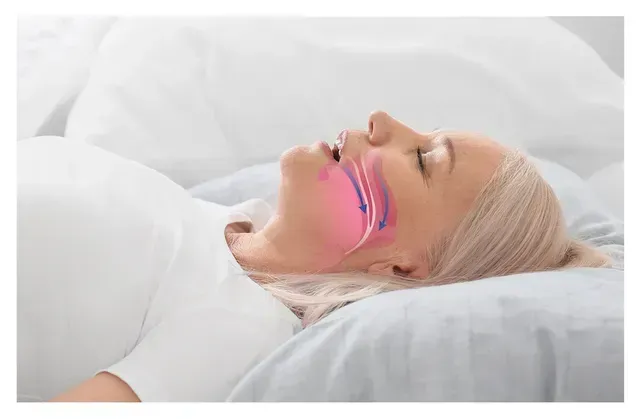Need a CPAP Alternative? Call: 717-995-3590
OFFICE PHONE: 717-995-3590
Sleep Apnea
Snoring & Sleep Apnea Dentist located in Harrisburg, PA

Sleep Apnea services offered in Harrisburg, PA
Up to 25% of men and 10% of women have sleep apnea –– a condition characterized by stopping and starting breathing during sleep. At Pennsylvania Dental Sleep Medicine in Harrisburg, Pennsylvania, sleep medicine dentist, Becky M. Fox, DMD, FAGD, D-ABDSM, treats sleep apnea using safe, effective, non-surgical therapy.
Call our office today or use our online booking tool to request an appointment.
Sleep Apnea Q & A
What is Sleep Apnea?
Sleep apnea is a potentially serious issue that affects your breathing during sleep. If you have untreated sleep apnea, you might stop breathing dozens or even hundreds of times each night. These episodes keep oxygen from reaching your brain and other organs, increasing your risk of more serious conditions like heart disease, diabetes, and stroke.
What are the types of sleep apnea?
At Pennsylvania Dental Sleep Medicine we offer treatments for obstructive sleep apnea:
Obstructive Sleep Apnea (OSA)
OSA occurs when the soft tissues at the back of your throat block your airways during sleep. That prevents oxygen from reaching your brain and vital organs, causing you to wake up gasping for air.
Central Sleep Apnea
Central Sleep Apnea occurs when your brain fails to signal the muscles responsible for breathing. It’s rarer than OSA and often more serious.
How is sleep apnea diagnosed?
Only a medical physician is able to diagnose sleep apnea. A Pennsylvania Dental Sleep Medicine provider will review your health records and asks about your sleep habits, including if you have a family history of sleep apnea if you ever fall asleep during the day, and if you stick to a regular sleep schedule.
Next, they complete a head, neck, and dental exam, to evaluate risk factors related to sleep apnea. If you have not been diagnosed previously, we then will refer you for a sleep study which may be in a sleep lab, or at home.
A PSG is an overnight sleep study supervised by a trained technologist. During a PSG, you wear a series of electrodes on your skin. The electrodes monitor various bodily functions while you sleep, including your heart rate, breathing patterns, eye movements, and blood oxygen levels. An at-home sleep study, or HST, may be recommended instead of a PSG if appropriate. The next morning, your medical physician reviews your test results and makes a diagnosis.
How is sleep apnea treated?
Treatment of sleep apnea depends on various things, including your age, the type, and the severity of your symptoms. Pennsylvania Dental Sleep Medicine may also recommend conservative treatments, like maintaining a healthy weight, quitting smoking, and avoiding caffeine and alcohol.
In addition to lifestyle changes and depending on your specific condition; your medical provider will review various options of:
- Oral appliance therapy
- Continuous positive airway pressure (CPAP)
- Mandibular advancement devices
- Surgery or implantable devices
- Positional therapy, such as sleeping with a wedge pillow
If your symptoms occur in conjunction with a sinus issue, like airway obstruction, a referral to an otolaryngologist may be in order. Options they can assist with may involve surgery with special tools to clear your airways, making it easier to breathe.
To learn more about Oral Appliance Therapy to treat sleep apnea, call Pennsylvania Dental Sleep Medicine or request an appointment online today!
Quick Links
All Rights Reserved | Pennsylvania Dental Sleep Medicine


